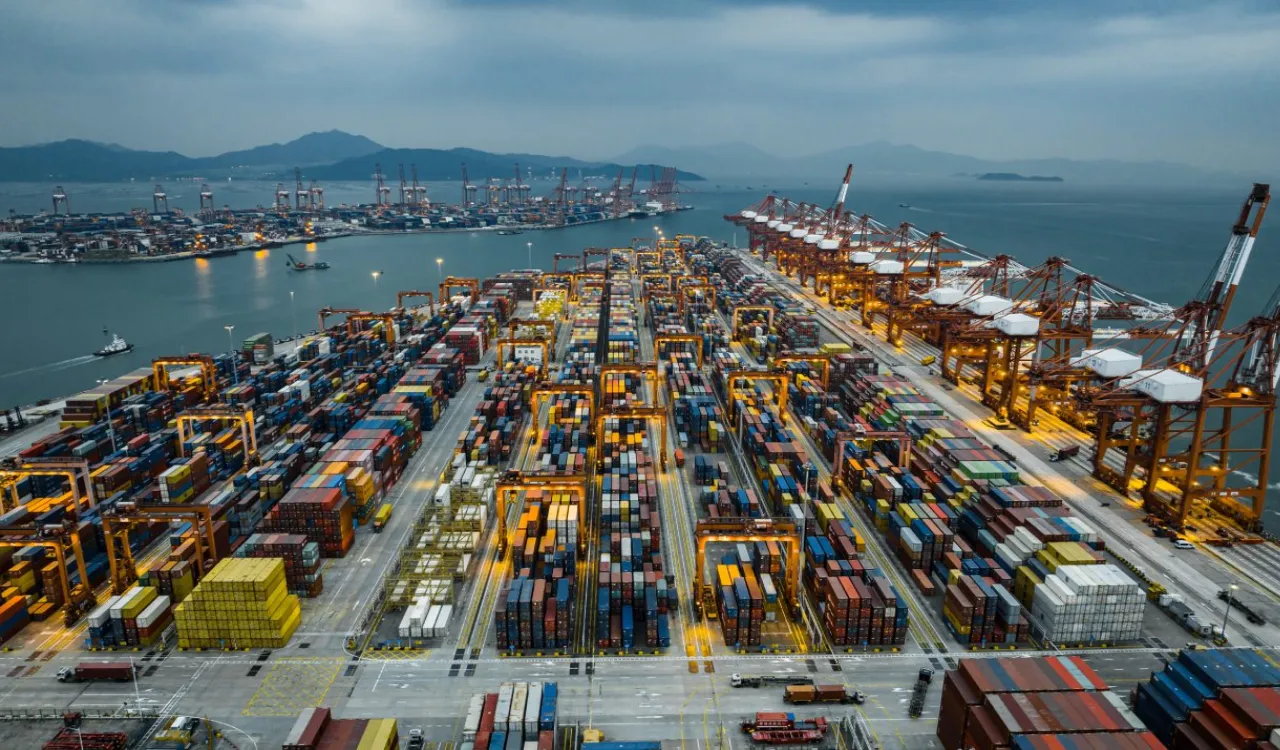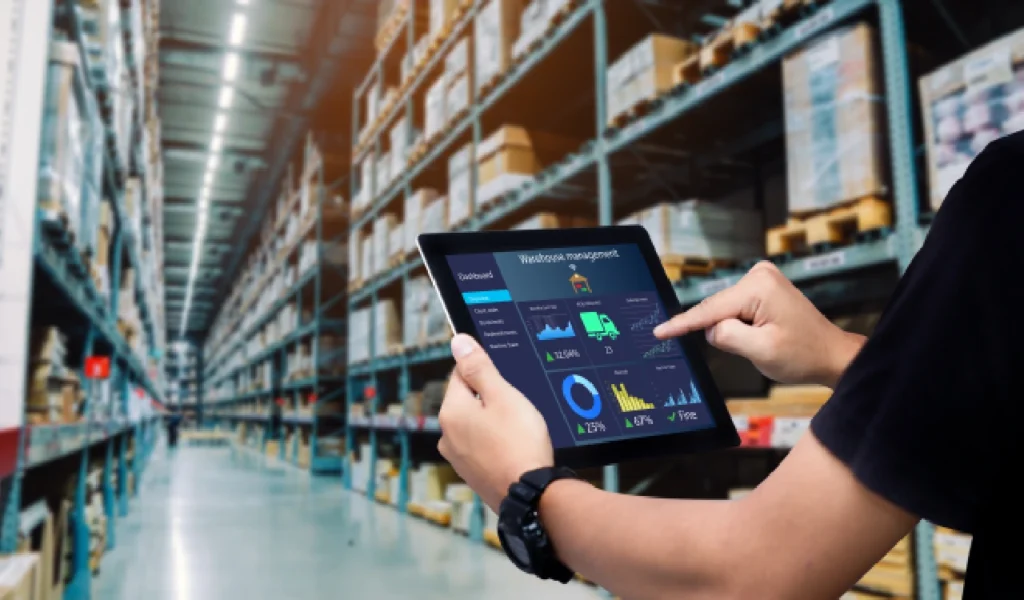5 Ways AI in Supply Chain Enhances Optimization

We are living in the world of global commerce, where supply chains stretch across continents and consumer expectations continue to soar. The need for AI in supply chain for precision and efficiency has never been more critical.
Today, the efficient orchestration of supply chain processes is not just a strategic advantage—it’s a necessity for survival and success.
AI is swiftly reshaping the supply chain landscape with innovative solutions. It is helping address age-old challenges, such as inadequate visibility, as well as upcoming challenges, like shifting consumer preferences.
This blog explores various ways of using artificial intelligence in supply chain revolution, its impact on different aspects of operations, and its potential to unlock significant benefits for businesses.
Role of AI in Supply Chain Optimization
From anticipating demand fluctuations to adapting to real-time challenges, AI aids in reshaping traditional paradigms across global supply chains. Let’s look at the multifaceted ways in which AI is revamping how businesses manage and streamline their supply chain operations.
Read More: Learn About the Importance of AI in Supply Chains
Optimizing AI in Supply Chain Inventory Management
Maintaining the right inventory level is critical in a retail business for cost and operational efficiency. Overstocking can lead to high carrying costs, markdowns, and even write-offs. On the other hand, stockouts can result in lost sales and customer dissatisfaction.
Artificial intelligence in supply chain addresses these situations by optimizing inventory through demand prediction.
By leveraging machine learning algorithms, an AI supply chain can analyze historical and real-time data, market trends, and multiple variables, such as seasonality, weather, and supply chain disruptions.
It can then accurately forecast demand and enable businesses to make informed decisions on how much inventory to hold. So, customers can get what they need and when they need it.
At the same time, retailers can minimize the risk of having excess stock in their inventory. The result is improved order fulfillment, reduced costs, and optimized working capital through artificial intelligence in supply chain.
Delivery Routes Optimized with AI in Supply Chain
The supply chain is an intricate web of operations consisting of suppliers, manufacturers, distributors, retailers, and consumers. How goods move through this web critically impacts the bottom line and customer satisfaction.
Inefficient route planning can result in high fuel costs, unnecessary wages, storage unavailability, and delayed deliveries. Hence, optimizing routes is a necessity, which is possible by leveraging artificial intelligence in supply chain.
AI for supply chain route optimization leverages advanced algorithms and real-time data analysis to determine the most efficient and cost-effective paths for shipments. It constantly processes and adapts to various real-time factors, such as traffic conditions, delivery locations, vehicle capacity and performance, and driver availability.
It thus ensures that the chosen routes are always optimized for the current conditions. As it continuously learns from data inputs and adapts to changing conditions, artificial intelligence in supply chain can help dynamically reroute shipments in real-time to avoid delays or unexpected challenges.
Furthermore, by considering factors like fuel efficiency, vehicle capacity, and delivery time windows, artificial intelligence in supply chain can identify the most economical routes, improving last-mile delivery and leading to significant savings in fuel expenses and operational costs.
Read More: Learn 5 Ways AI Can Optimize Supply Chains
Real-Time Decisions with AI in Supply Chain
The retail market is complex and dynamic. In this market, the ability to react swiftly to changing conditions or unforeseen events is a must-have for retailers. For example, replenishing stock during a sudden demand surge or finding the best route in case of high traffic or a road closure.
The role of AI for supply chain’s real-time decision-making capabilities is particularly impactful. It transforms decision-making from a retrospective and manual endeavor to a proactive and automated process.
The AI supply chain algorithms can process data from diverse sources, including IoT sensors, RFID tags, and historical transaction records, in real-time. This capability allows businesses to quickly understand the status of their inventory, production processes, and transportation networks, empowering decision-makers to respond promptly to changing conditions.
By continuously monitoring demand patterns, stock levels, and market trends, the AI supply chain systems can dynamically adjust inventory levels, reorder supplies, and optimize distribution routes in response to fluctuating demands.
This prevents stockouts and overstock situations and ensures that businesses can meet customer demands with precision.
Read More: Learn the Key Differences between Traditional and Generative AI
AI in Supply Chain: The Blueprint for Efficiency
AI supply chain not only streamlines individual processes but also establishes a cohesive and interconnected ecosystem to enhance collaboration across the entire supply chain. This fosters collaboration and responsiveness.
Whether it’s demand forecasting, inventory management, or logistics planning, AI for supply chain provides a unified platform. This facilitates real-time communication, order adjustments, and performance feedback.
It ensures that all stakeholders, from manufacturers to distributors to retailers, operate with a shared understanding of the current state of the supply chain. This transparency is instrumental in building trust among supply chain partners and fostering long-term relationships that contribute to the overall resilience and agility of the supply chain ecosystem.
As a result, decision-makers can respond rapidly to changes, optimize resource allocation, and mitigate disruptions through AI for supply chain management.
Read More: Learn about Supply Chain Realities in a Changing World
Elevating product quality checks
Traditional (or manual) quality checks can be time-consuming, prone to human error, and insufficient for handling the complexities of modern supply chains. In comparison, AI-driven quality control systems can analyze vast amounts of data and identify and even predict patterns associated with product defects.
Machine learning models can also be trained to understand the unique characteristics of different products and identify deviations from the specified standards. This enables businesses to implement AI for supply chain management with a more nuanced approach to quality assurance and detect the slightest hindrance to high product quality.
Moreover, AI models learn from the data generated during quality inspections and help optimize production processes, refine quality standards, and even predict potential issues before they occur.
Read More: Explore the Challenges of Implementing AI in Supply Chains
Today, retail stands poised for agility, resilience, and customer-centricity, thanks to the transformative power of AI for supply chain management. The journey from data-driven insights to actionable strategies marks a transformative era for the industry. The integration of AI supply chain enables retailers to move beyond traditional approaches, embracing the agility and adaptability they never had.


